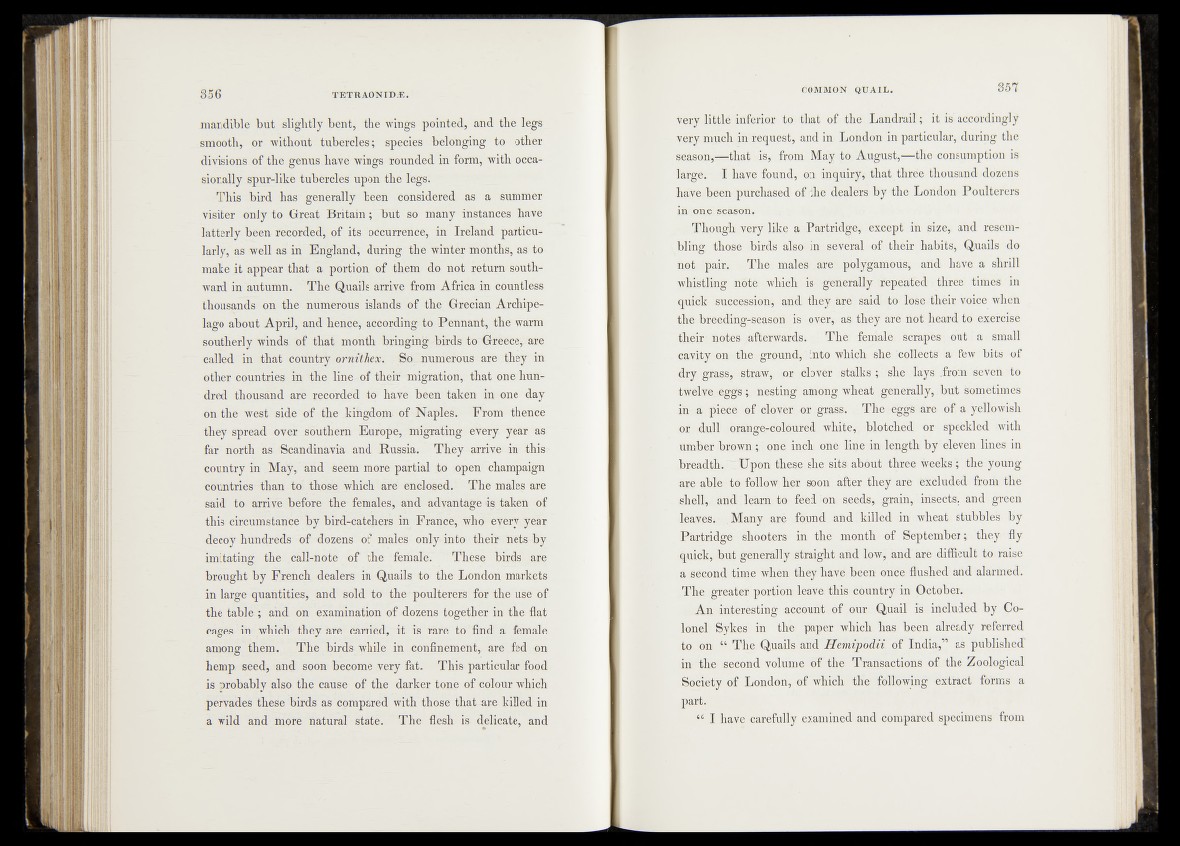
mandible but slightly bent, the wings pointed, and the legs
smooth, or without - tubercles ; species belonging to o th e r
divisions of the genus , have wings round ed in form, with' Occasionally
spur-like tubercles upon the legs. '
This bird has generally been considered as a summer
visiter only to Great Britain ;'~Fut so many instances have
latterly been- recorded,, of its occurrence, in Ireland particularly,
as well as in England, during the winter months, as tb
make it appear that a portion of them do not return’southward
in autumn. The Quails arrive from Africa in countless
thousands on the numerous islands of the Grecian Archipelago
about April, and hence,' according-to Pennant, the warm
southerly winds of that month bringing-birds tor Grëece^are
called in that country ornithex, Smnumerbus-are dhey in
other countries in the line-of theifbnigrationy that one hundred
thousand are .recorded to have been taken : intone day
bn the west side of the .kingdom of Naples. *Frbm thence
they spread over .southern Europe, migrating ‘every year as
far north as Scandinavia and Russia. They arrive in this ’
country in . Mayr'und seem more partial to champaign
countries than to. those which are enclosed.' The males are
said to arrive before th e females, and advantage % taken of
this circumstance by bird-catchers in France, whd^|l$y year
dêëby hundreds of dozens of males- only into theif^hefeby
imitating the ,call-note o f the 'female." Thèse birds* 'are
brought by French dealers in Quails to the London markets
in large quantities* and sold to the ’ poulterers for the use of
the tablé ; and on examination of dozens together in the flak
cages in which they are carried, it is rare to find a female
among them. The birds while in confinement, are fed on
hemp, seed, and soon become very fat. This particular food
is probably also the cause of the darker J,one of colour which
pervades these birds as compared with those that -are killed in
a wild and more natural state. The flesh is delicate, and
very little iriferio^fo that of the Landrail; it is-accordingly
yery much ihi^âpèt-,-. and in London in particular, during the
s^|sob0-thÿt M lf c om Aiugnst^rrfKe consumption is
làr-gê^ÿÿl havé1, foilénd, pn^ inqg^rÿj that. three thousand.'dozens
haye'fb^en-.purchasedl offflbfuMiërs by «thdcLondon Poiitiifers
iû on.éffe^ason.
' I11 mn< ayP-ajTjjsidgc^except'fih size, and: resem-
blihg those'biï(h aho^-in'sc,v^l, (>fbhé|E,batóisp;,Quails do
\ Thè, nialè.SïsbfL'Eey-polygamous, ,>andv havé a shrill
whistling n^É^N licit gfltgenyralk \%$Q‘aïfed threéf éimè^in
qaijçk* and they are said to lose their voice when
fel grafl o vcr..ÆS; frlfcjS|BHbf heard we®ereise
thg'ir-* /dtorwards. - 5 Hfô fombied s c ra ^ ^ out a small
qàfity on fhc^t^jjwuhf into wifel'i. sli&;lcoljfee®?a few'bits of
■flro’r^rass-a.-strawSsB^èl&èr' stalks ; 'she .day'Sf^feoSnMeyefl'j'to
ta>l5;c/4ggS ;^h'es>w^anfeng. wheat generally,-jbut ^otoétimëfe
in a grass. ‘d^W^^gf^^rè-Kof àfyëlfpwish
.of -dâli o^^g^-cféllëured ^pa^V^blotclîëd^Q®'^ speckled ifwi'th
umber ,bwâWn ; one”! inch; onebbnjs inflfengthf by5 efe®efi‘ lines? in
breadthvf?3&p^d ab.ê;uf^tbfe^%eeks 1 the-young
are -able. torfbllfW: hgr;|||fnÿ! after" they are 'li^ lÉ |m c frpriivthe
shell d ; 1 earn to,*, fend ;om rseefls?; igram^iWectel and-green
leaye^W .’Many aré fô^und khdifilled |ii|ï^he^fe'%l®îFl^^by
Partridge v^hbpfpfs^iiii the- month of September; they'fly
'î» ëk , but gpiifefâlly straight and low, and ^afè diffictdkitesfaise
a iJftpUd time when they hav,e been^once- flushed and alarmed.
The.-greater portion .leave, this'èodntryl in <®atober*r'
An i nterestingi ftebu#lipfvour Quail id inóltdëdlby Colonel
Sykes- in th%fj paper which has been already referred
to on “ The Quails and Hemipodii. of India,’’ as published
in the second vOlffriie oTtlie Transactions of the Zoological
Society of London, of which^the- «following extract forms a
part.
“ I have carefully examined and compared specimens from